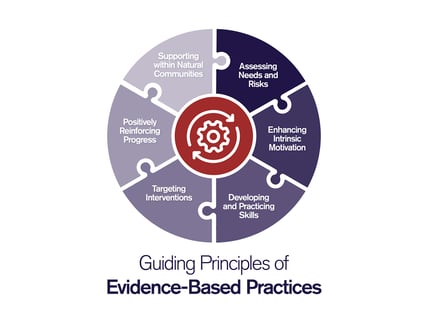
Reentry programming can be incredibly beneficial for many individuals, helping them learn life and vocational skills that prepare them to reenter society with a solid foundation and in theory, reduce their risk of recidivism. What can often be difficult is measuring the effectiveness of those programs. We hear from former residents about how programs have helped them reenter society, however, it is important to look at the broader picture to see the effect that reentry programs have on those in our care.
Using research to make informed decisions is vital for any organization. This is especially true in the field of corrections, where the decisions being made can have a profound effect on a justice-involved individual's life. But how is that research being done, and more importantly, how can we be sure that the results are correct? Michelle Wier is a research analyst for the Reentry Services team at CoreCivic. Using her experience as an academic researcher, she is able to discern which data points are significant and which ones may need additional context.
 "In my experience working with studies where the observable data points range from as little as 30 to over 1 Million, I can tell you one thing: all data has problems, and you aren't always able to find exactly what you're looking for," said Wier.
"In my experience working with studies where the observable data points range from as little as 30 to over 1 Million, I can tell you one thing: all data has problems, and you aren't always able to find exactly what you're looking for," said Wier.
A recent study sought to answer that question by assessing three studies that aimed to determine the effectiveness of three different reentry programs. What they found is that these programs—one assessing the effects of a probation program for recently-released individuals with substance-related charges, a second studying aftercare programs for recently released individuals with substance use disorders, and a third that measured the effectiveness of a comprehensive reentry program— were able to generally show reductions in recidivism. Separately, the original research was in some cases unreliable due to a variety of reasons including small sample sizes and selection bias. This underscores the importance of accurate and detailed analysis.
"Part of my area of expertise is to analyze that data and figure out a way to identify and maneuver around those problems to find observable, repeatable, and most importantly, accurate answers to the questions we're asking," Wier said.
More work is needed to completely understand the role of reentry programming and its effect on recidivism. However, as more research is conducted and new, innovative programming is launched around the country, there is also growing support for these types of programs at both the state and federal level, which is a promising sign.
 "It's encouraging to see the criminal justice landscape change as a whole to focus more attention on effective reentry policies and programming," Wier said. "That's why now is the time to examine and research these programs, using statistics and data analysis, to gain more clarity and gauge their impact on reentry."
"It's encouraging to see the criminal justice landscape change as a whole to focus more attention on effective reentry policies and programming," Wier said. "That's why now is the time to examine and research these programs, using statistics and data analysis, to gain more clarity and gauge their impact on reentry."
CoreCivic is committed to ensuring that our reentry efforts—from the programs we facilitate inside of our correction and detention centers to the those in our community-based facilities—are backed by evidence-based practices and are based on up-to-date research.
